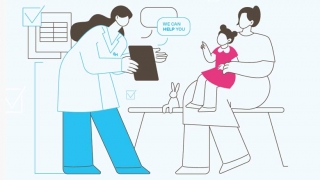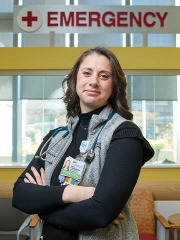Medicine — and More
Published on
Published on
By Zan Hale
 Families come to the Emergency Department (ED) at Children’s Hospital of Philadelphia when their child has a pressing medical problem. Thousands of families in need have left more hopeful because of a novel program, Family Connects.
Families come to the Emergency Department (ED) at Children’s Hospital of Philadelphia when their child has a pressing medical problem. Thousands of families in need have left more hopeful because of a novel program, Family Connects.
Family Connects does what its name implies: connects families that have social needs — food insecurity, unstable housing, mental health concerns and more — to area resources that can provide aid and support. Here are a handful of people Family Connects has helped:
 Emergency Department physician Lauren VonHoltz, MD, MPH, and her colleagues started Family Connects during the pandemic to help families with their social needs.
A group of Emergency Department clinicians, led by Lauren VonHoltz, MD, MPH, created Family Connects in response to families facing dire circumstances early in the pandemic. Dr. VonHoltz saw the urgent needs and wanted to help beyond providing immediate medical care. Families were so grateful for the help they received that Dr. VonHoltz and her colleagues felt the program should continue. To maintain Family Connects, they were awarded an internal CHOP grant that offers seed money for promising programs.
Emergency Department physician Lauren VonHoltz, MD, MPH, and her colleagues started Family Connects during the pandemic to help families with their social needs.
A group of Emergency Department clinicians, led by Lauren VonHoltz, MD, MPH, created Family Connects in response to families facing dire circumstances early in the pandemic. Dr. VonHoltz saw the urgent needs and wanted to help beyond providing immediate medical care. Families were so grateful for the help they received that Dr. VonHoltz and her colleagues felt the program should continue. To maintain Family Connects, they were awarded an internal CHOP grant that offers seed money for promising programs.
Once a family is settled into a treatment room in the ED, they receive a text message explaining Family Connects and asking if they would like someone to stop by to talk about any social needs they may have. A Family Connects representative comes to the rooms of those who reply “yes.”
After introductions, the representative begins a conversation with the parent or guardian to explore options. Does the family need help with food, housing, clothing, utilities, mental health or childcare? Some resources, like diapers, formula and snacks, exist right in the ED. For others, the representative explains resources available through CHOP, community organizations and government programs. For resources that are the right fit, the representative sends the relevant information directly to the parent or guardian.
Sometimes, a parent or guardian might not express a specific need but instead use the opportunity to talk about stresses in their lives, how they are feeling overwhelmed or nonmedical concerns about their child. By simply listening, the representative provides emotional support they might not find elsewhere.
On occasion, individuals have opened up about their own mental health needs or being the victim of intimate partner violence. In these cases, the representative involves the CHOP ED social worker to direct them to services they need.
Family Connects representatives are medical, nursing, public health and social work students at the University of Pennsylvania (Penn) who volunteer for the role. They are trained in how to approach families and build trust, so families feel comfortable sharing their needs and stories. The students learn about finding resources to help meet the families’ needs.
Having students in the role has the far-reaching additional benefit of building a future healthcare workforce with a real-world grasp of the social needs of families in under-resourced communities and the skills to respond with empathy and compassion.
“We are providing very hands-on and tangible education about social determinants of health, of how you address these issues and about how you can have these conversations with families,” Dr. VonHoltz says. “Most students will go to an advocacy lecture or two throughout their training and gain some baseline knowledge about it. But until they really experience the breadth of people and the extent to which our families in the greater Philly area are struggling with social needs, they can’t truly understand how important it is.”
Listed by number of requests
Housing
Food resources
Baby/child items
Utility needs
Community mental health resources
Child/daycare
Transportation
Financial assistance
Clothing
Education resources
Applying for social services
Employment
Health/dental insurance
Teen resources
Disease-specific information
Primary care resources
Case management
For some students, their involvement with Family Connects has altered their career trajectory.
Cassandra Branigan, a Master of Public Health candidate at Penn who also works fulltime at a healthcare-related company, says her time as a volunteer has cemented her decision to move away from the business side of medicine and focus on how to get people the help they need.
“My goal is to ultimately be a project manager to design and implement interventions in the community to improve health and well-being,” she says. “Family Connects has been an amazing experience for me to talk with people in the community and understand the challenges they're facing and also the barriers they face in trying to navigate the system today. It's been eye-opening to hear people's stories.”
For Sarah Finstuen Magro, an MD-PhD student at Penn’s Perelman School of Medicine, volunteering for Family Connects has given her the space to build understanding and skills not available in the classroom.
“You never really know what a family is going through, what their needs may be,” she says. “When I started, I just wasn't comfortable doing this sort of thing. Now I can walk into a room with strangers, talk to them and establish a relationship quickly. I’ve learned to be open-minded and not project my thoughts onto their situation. I ask questions and listen. I've had many people share all sorts of really difficult hardships with me.”
Magro adds, “We know that the social determinants of health are critical to people’s overall health. But hearing about the hardships people have makes it real. I believe this experience is going to make me be a better physician.”
To learn more about how you can support Family Connects, contact Senior Associate Director of Annual Giving Melissa DeFreece at defreecem@chop.edu.